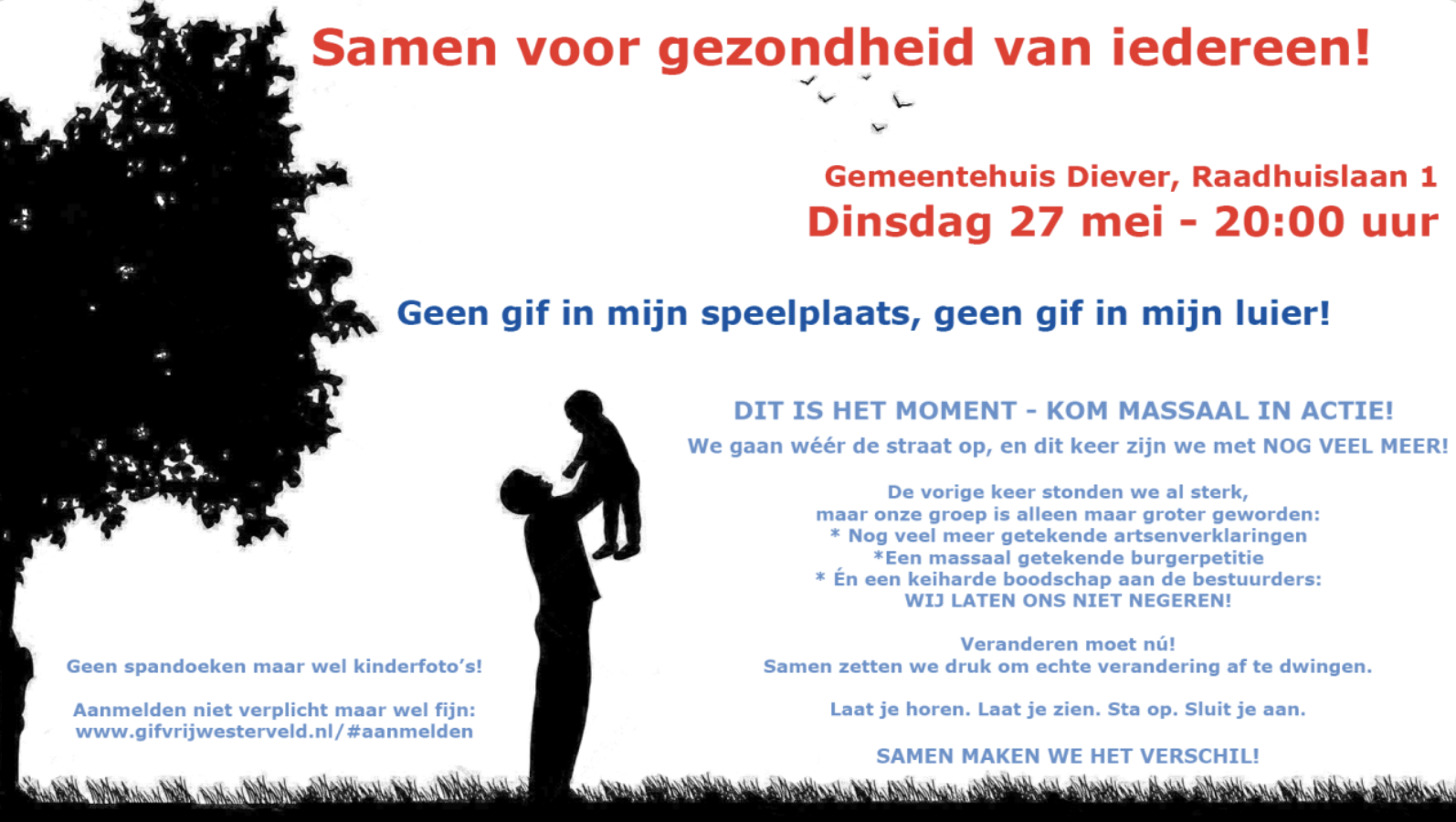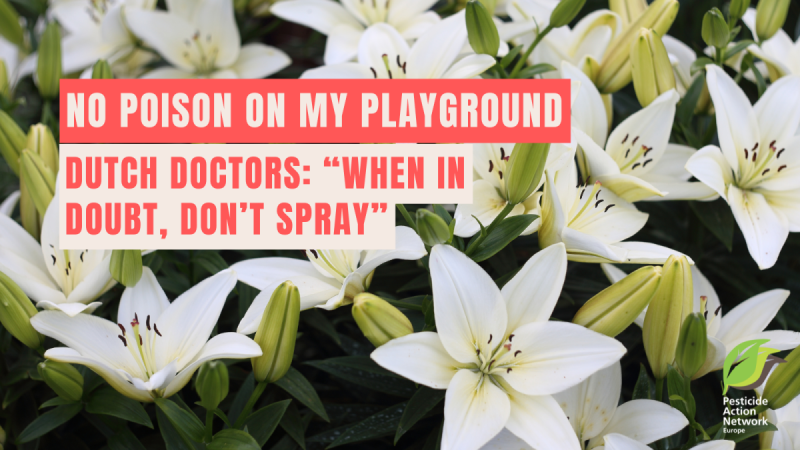The intensive pesticide use in flower fields in the Netherlands has led to a movement of concerned citizens, scientists and doctors. They see an increase in lily production close to homes and schools in some parts of the country, with high risk for health. The topic has led to heated debates, court cases, threats to whistle blowers, lots of publicity, a large demonstration in the capital The Hague on World Parkinson Day, local manifestations and now a clear and outspoken protest by over 500 doctors: “When in doubt, don’t spray.”
The city hall of the small commune Westerveld in the north of the Netherlands was packed on the 27th of May. Outside the room where the local council met a manifestation of concerned citizens asked for an immediate ban on lily growing. “Together for everyone’s health” was the slogan. “No poison on my playground, no poison in my nappy”.
The demonstrators in the rain faced a row of some 25 tractors. Local farmers feel they are ‘ bashed’ by opponents of pesticide spraying. Their ‘silent protest’ quickly changed into a loud and honking tractor demonstration, disturbing the discussion in the city council building.
The town is surrounded by lily growers. The conventional production of these flowers requires an industrial approach with heavy pesticide use including weekly sprayings of a cocktail of fungicides and insecticides. Citizens and especially young parents fear for their health and that of their children.
The bulbs and flowers are mainly exported to south east Asia and specialized growers offer local farmers high rewards to use (and destroy) their fields. Local residents suffer and live in fear, as the pesticides drift across the fields into the nearby gardens, houses, playgrounds and schools. Local authorities prioritise economic gains, but tend to forget the health of their citizens. The struggle and protest movement recalls memories of actions by inhabitants of towns and villages in South America that are surrounded by genetically manipulated soy fields, multiple sprayed with roundup and other pesticides.
A blanket of pesticides over the land
The Dutch citizens' initiative Meten=Weten (To Measure =To Know) is a committee of concerned citizens. They had 87 samples analysed from (vegetable) gardens, natural areas, field edges, succeeding crops, surface water, compost piles, soil, manure and air. They found 132 different pesticides and breakdown products. All measurement data were processed and linked together from a helicopter view. The main findings: There is a blanket of agricultural toxins over the Netherlands and pesticides spread (much) further than the field that was sprayed. They distinguish three groups of pesticides:
- a group that is not found outside the field
- a group that spreads up to about 1 km from the field
- a group of volatile substances that is found even deep into natural areas
They conclude: “The discovery shows that current policies on pesticide authorisation and use must change radically to protect humans and nature.” A larger follow up research together with PAN Netherlands showed similar results and pointed at the most volatile and very toxic pesticides pendimethalin, prosulfocarb and folpet that should be banned immediately.
Comparable studies have been done in South Tyrol, Italy and in France, as we described in this overview of failing protection and largely insufficient buffer zones.
The findings were recently confirmed by a large German study, where a group of scientists showed that pesticides contaminate on a landscape scale. The team, led by Professor Dr. Carsten Brühl tested topsoil, vegetation, streams and puddles from 78 locations over a 180 km stretch, from remote areas in the UNESCO forests on the mountain ranges to the farmland in the Upper Rhine area. The research team detected a total of 63 pesticides. Almost all measurement sites were contaminated. Residues were found in 97% of the soil and vegetation samples, often in complex mixtures of several active ingredients.
These findings confirm that residents’ concerns are very realistic. Especially if you combine it with the many loopholes in the pesticide authorisation, the fact tat many authorisations are outdated, that there is often a range of new studies on problematic effects on health and environment and that in recent re-evaluations these new studies have been largely ignored by the authorities.
The international research team SPRINT found 170 different pesticides in house dust in the Netherlands and other countries. Most found was glyphosate. "We’re surrounded by a cloud of pesticide residues”, said Wageningse University professor Violette Geissen. "We inhale them and eat them. What this does to our health and ecosystem is not clear."
The Parkinson Pandemic - Neurotoxicity not properly investigated
One specifically worrying topic is the likely connection between pesticides and damage to the brain. Embryos and young children are especially vulnerable, but the whole population is at risk. Parkinson specialists have been very vocal on the possible connection between pesticides and Parkinson. The Radboud University professor Bas Bloem is one of the world main specialists. He warns especially for the cocktail of pesticides and other chemicals that we are often exposed to. Bloem has been interviewed by many Dutch TV programs and his explanation of The Parkinson Pandemic video is viewed over 1,5 million times.
For some substances, like Paraquat, the link is quite clear, although producer Syngenta still denies the scientific evidence. For many other pesticides there is either proof that they are neurotoxic – like the whole group of neonicotinoids including the widely used insecticides abamectin and deltamethrin – others like glyphosate are suspected to be neurotoxic.
But proper tests on neurotoxicity are not sufficiently done when assessing pesticides. This was acknowledged by the Dutch Health Institute RIVM and confirmed by the Dutch pesticide authorization body Ctgb. The Dutch parliament discussed the matter and the minister asked EU food safety authority EFSA’s opinion. In a special conference some 50 experts – scientists and representatives of pesticide authorities from several EU countries including 5 from EFSA - met and concluded that improvements are urgently needed. But their recommendations were not followed up by the EFSA management, that took steps in a different direction that might delay proper assessment by many years.
Recently a national demonstration in the capital The Hague asked attention for the problem. On May 27th the Parkinson Association, trade union FNV and the NGO Natuur & Milieu handed over a petition to members of the parliament to ask for a precautionary approach and to stop the spraying of pesticides suspected to be linked to Parkinson’s: Call to Action, Better Safe than Sorry.
Health concerns not taken seriously: Concerned doctors and parents
There is a lot of concern in the communities where flowers are grown. Almost 3000 inhabitants and visitors of the town already signed the petition Toxic Free Westerveld.
“Safety First! We call on the Westerveld college and municipal council to immediately stop allowing the use of pesticides in the vicinity of people and to actively enforce this. The health and safety of residents must always come first.”
Now 500 doctors have joined the discussion. The action was started by Evelien van Soldt. She is a local doctor and rotates shifts at several medical centres in the region. She is shocked by the relatively high number of cases of Parkinson's and ALS. She comments: “Also in young people. And when you set that against the relatively low number of inhabitants living here, it says something. Until it is proven that plant protection products are not harmful, the municipality should ban their use. When in doubt, don't spray.”

